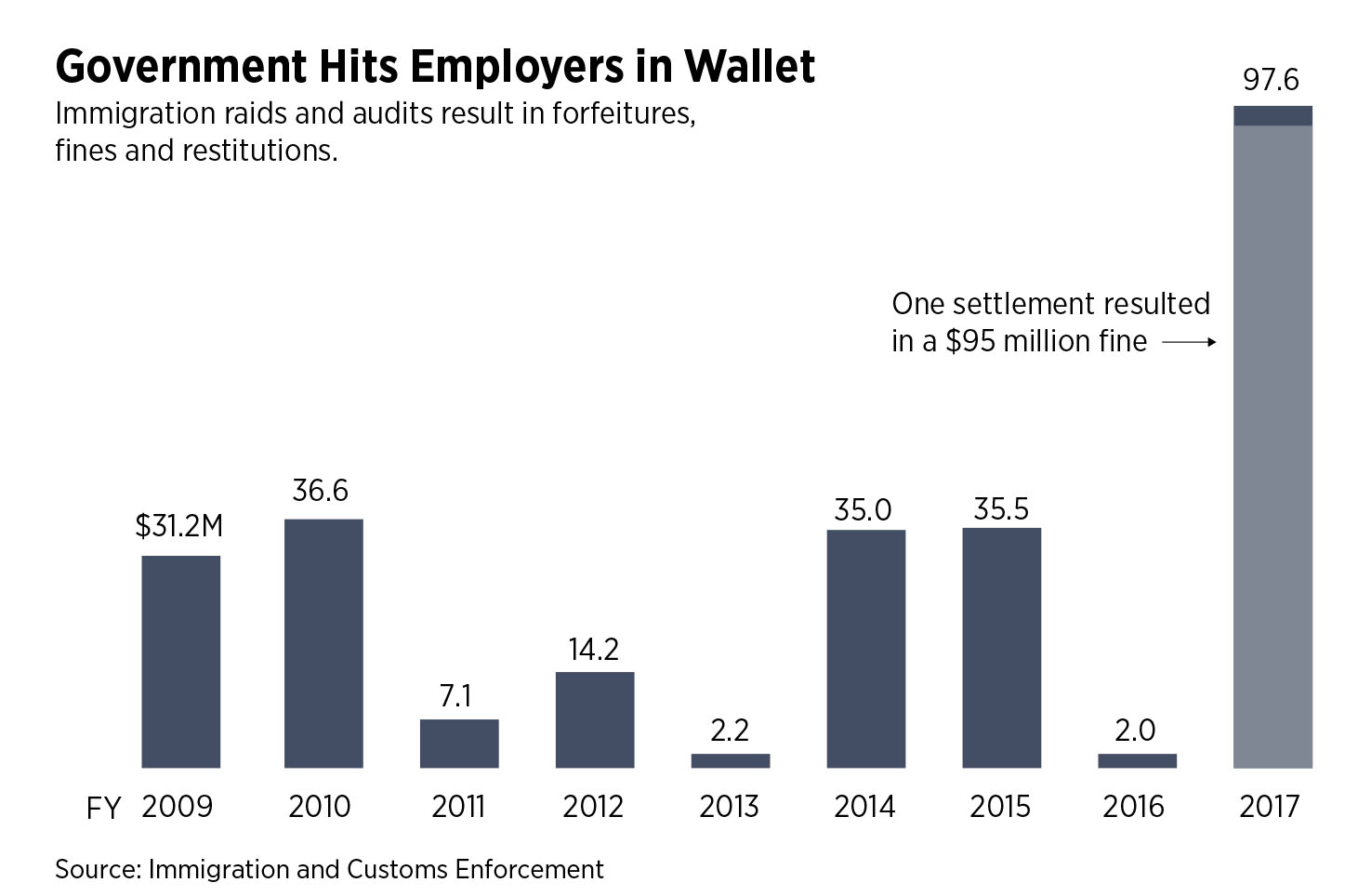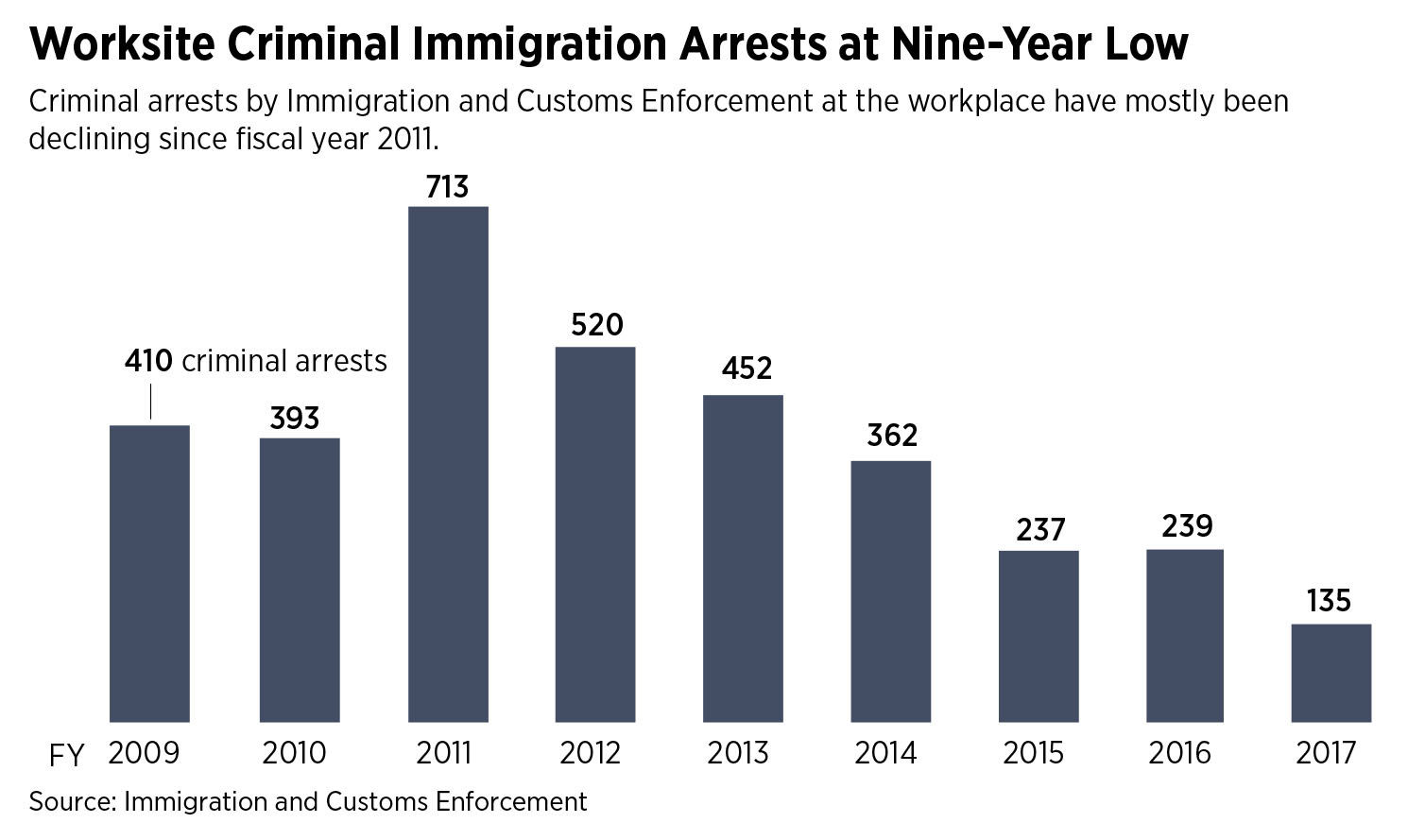The ICE Man Cometh, Prompting a New Look at E-Verify
After high-profile federal raids, Congress is revisiting an employment verification system

When federal agents arrived at nearly 100 7-Eleven locations across the country last month to check the paperwork of store clerks selling Big Gulps and coffee, it was the clearest sign that President Donald Trump is serious about taking on employers who illegally hire undocumented immigrants.
Twenty-one arrests were made during the Jan. 10 raids at convenience stores in 17 states and the District of Columbia in what was the Trump administration’s strongest action yet targeting employers. Thomas Homan, acting director of U.S. Immigration and Customs Enforcement, said at the time that the raids sent “a strong message” to employers that “ICE will enforce the law, and if you are found to be breaking the law, you will be held accountable.”
That kind of tough talk has been delivered before, from Republican and Democratic presidents whose administrations have carried out similar raids. The government has collected more than $260 million in fines, forfeitures and restitutions from law-breaking employers since 2009, including $95 million from a single settlement last September — the largest ever by ICE.
Homan said the practice of hiring undocumented workers has for decades been a major “pull” factor contributing to illegal immigration. Trump is determined to eliminate that magnet, he said, because it would protect job opportunities for American workers.
The problem, according to lawmakers and immigration experts, is that few employers end up behind bars.
Watch: DACA Protesters Sit on Senate Steps, Get Arrested
“Employers in my experience are indicted and have to pay a fine, but they aren’t going to jail,” said Allen Orr, who runs an immigration law firm in Washington.
There’s disagreement in Congress over how to legislate tougher workplace enforcement that would weaken the jobs magnet, even as fewer undocumented immigrants appear to be trying to enter the United States. Some want to force employers to use a government system called E-Verify to make sure they’re hiring only people who are eligible to work.
“Nearly 20 million Americans are unemployed or underemployed. Meanwhile, 7 million people are working in the United States illegally,” said Rep. Lamar Smith, a Texas Republican who has introduced mandatory E-Verify legislation in multiple Congresses. “By expanding the E-Verify system to all U.S. employers, this bill will ensure that jobs only go to legal workers.”
During the 2016 election, immigration restrictionists who pined for a president willing to take on errant corporations thought they hit pay dirt with Trump, who spoke passionately about an immigration policy that would give American workers an economic advantage.
Trump has already stepped up interior enforcement and border security, so worksite enforcement is the logical next step in his immigration agenda. As Congress takes a stab at revising immigration policy, as Trump has asked lawmakers to do, mandatory use of E-Verify is likely to be a topic of debate on Capitol Hill.
“Until you have that, it all depends on the will of the president and everyone underneath the president and all the members of Congress to not bend to the corporate lobbies,” said Roy Beck, president of NumbersUSA, which advocates for lower immigration levels and tougher worksite enforcement.
Familiar pattern
The 7-Eleven raids don’t constitute new policy, as past presidents routinely ordered similar, high-profile blitzes to send a message.
Under President George W. Bush, ICE raided six Swift & Company meatpacking plants in Utah, Colorado, Iowa, Nebraska, Texas and Minnesota in December 2006, detaining at least 1,300 undocumented immigrants.
Days after the raids, then-Homeland Security Secretary Michael Chertoff urged Congress to create a temporary worker program that answers the United States’ “economic need without putting people in a position where they are sorely tempted to break the law.”
In the agriculture sector, in particular, Chertoff said there were growing complaints from farmers who could not find field hands to pick lettuce and harvest other crops.
The Bush administration also made headlines after it began charging undocumented immigrants working in the U.S. illegally with a variety of criminal offenses.

On May 12, 2008, 389 people were arrested at Agriprocessors in Postville, Iowa. More than 300 of those individuals were charged with identity theft, falsely using a Social Security number or card, and illegally re-entering the United States after being deported.
At the time it was deemed the “largest criminal worksite enforcement operation ever in the United States,” according to U.S. Attorney Matt M. Dummermuth.
Sarah Pierce, an associate policy analyst for U.S. programs at the nonpartisan Migration Policy Institute, said the Bush administration’s unstated goal was clear.
“This raid was meant to be a high-profile raid. It was meant to send a message,” she said. “The message is that the United States is not a friendly place for immigrants, but it encourages these populations to go underground further and further.”
President Barack Obama took a low-profile approach and focused more on employer audits.
Companies are required to get most workers to complete Employment Eligibility Verification forms, or I-9s, and keep them on file. After a random inspection, ICE typically gives a company three days to produce its I-9s. If some are fraudulent, the company could be made to pay a fine. If a company is found to have knowingly hired undocumented workers, owners or managers could face criminal prosecution.
The number of audits conducted by ICE surged during Obama’s first term, from 1,444 in fiscal 2009 to 3,127 in fiscal 2013.

Pierce said during Obama’s second term, his administration shifted its focus to detaining undocumented immigrants with criminal records rather than those merely working illegally in the United States. The number of I-9 audits fell by more than half from fiscal 2012 to fiscal 2016, as did the number of criminal arrests of management-level employers, according to statistics provided by ICE.
“By the end of the Obama administration the priorities were border enforcement and going after undocumented immigrants who committed crimes, not so much working illegally,” Pierce said.
Trump’s move
Trump signed a “Buy American, Hire American” executive order in April requiring the Homeland Security, Justice, Labor and State departments to propose new regulations that would “protect the interests of United States workers in the administration of our immigration system, including through the prevention of fraud or abuse.”
But the order didn’t take any real aim at employers who hire undocumented workers, focusing instead on abusers of the H-1B “high-tech” visa program. Without mandatory E-Verify legislation, it was unclear what Trump could do without Congress.
Then, ICE announced in September that an investigation that began during the Obama years concluded in a $95 million criminal settlement with Asplundh Tree Expert Co., a Pennsylvania-based tree trimming company that ICE accused of skirting laws to dominate the market with an undocumented workforce.
Homan announced a month later that he was ordering the agency’s Homeland Security Investigations division to increase its workplace enforcement “by four to five times.” A gruff, blunt career cop who leapfrogged his former boss when Trump nominated him to lead ICE, Homan is exactly the type of enforcer who could instill fear in lawbreaking employers.
Homan vowed ICE would begin arresting more undocumented workers during worksite inspections, a practice that has dwindled since Obama’s first term. In fiscal 2017, ICE apprehended 172 workers on civil immigration charges, down from 1,644 in fiscal 2009.
Management-level criminal arrests have also been in steady decline: ICE made 135 criminal arrests in fiscal 2017, including 62 management officials, according to agency statistics.
“Not only are we going to prosecute the employers that hire illegal workers, we’re going to detain and remove the illegal alien workers,” Homan said of the future under Trump.
Beck of NumbersUSA said increasing the number of raids without an increase in prosecutions and fines is pointless. “Breaking the law is, for businesses, a cost-analysis decision and they decide that it’s profitable to break the law,” he said.
He worries that Trump’s friends could dissuade the president from ordering his administration to take the gloves off. That’s why he wants Congress to pass mandatory E-Verify legislation.
“It’s enforcement on autopilot,” Beck said.
Business groups, however, tend to oppose E-Verify because of the impact an instantly dwindling workforce could have on a particular industry, such as agriculture. Without workers to replace undocumented immigrants, some industries could be shocked into oblivion.
“It would be a super huge problem,” said Paul Schlegel, deputy executive director for public policy at the American Farm Bureau Federation.

Pushing Congress
Republicans have spent years pushing to mandate the use of E-Verify, which Congress created in 1996. In fiscal 2017, the program audited about 35 million I-9s, weeding out nearly 330,000 fraudulent ones. More than 500,000 businesses are enrolled in the program.
The House Judiciary Committee approved Smith’s latest mandatory E-Verify bill in October, and it was wrapped into Chairman Robert W. Goodlatte’s proposal to solve the current crisis facing “Dreamers” enrolled in the Deferred Action for Childhood Arrivals program.
Goodlatte, a former immigration lawyer, has proposed offsetting the effects on agriculture by creating a new guest worker visa program that would allow experienced undocumented workers to present themselves to the government and receive legal status — as long as they return to their home countries between harvests or other work periods.
Schlegel said his organization likes the idea behind the Virginia Republican’s supplemental visa proposal, but still has some concerns, including whether enough work permits would be made available to supplant the number of workers lost because of fraudulent I-9s.
Democrats in years past have resisted requiring use of E-Verify because they say it would create labor shortages in the agriculture industry and expose too many undocumented immigrants for deportation, a concern made more prescient given the Trump administration’s wide enforcement scope.
But given the proper motivation, it is possible Democrats could be swayed.
Mandatory E-Verify language was included in the comprehensive immigration bill the Senate passed in 2013. The 52 Democrats who supported it were, perhaps, driven by the fact the bill would have granted a pathway to citizenship for an estimated 11 million undocumented immigrants living in the United States.
Now, with the fates of nearly 700,000 Dreamers placed squarely in the hands of Congress, Democrats are again weighing a decision to change course.
Rep. Luis V. Gutiérrez, an Illinois Democrat who was arrested at multiple Dreamer protests last year, said that now is the time for tough decisions.
“I’m ready to do E-Verify,” he said.





